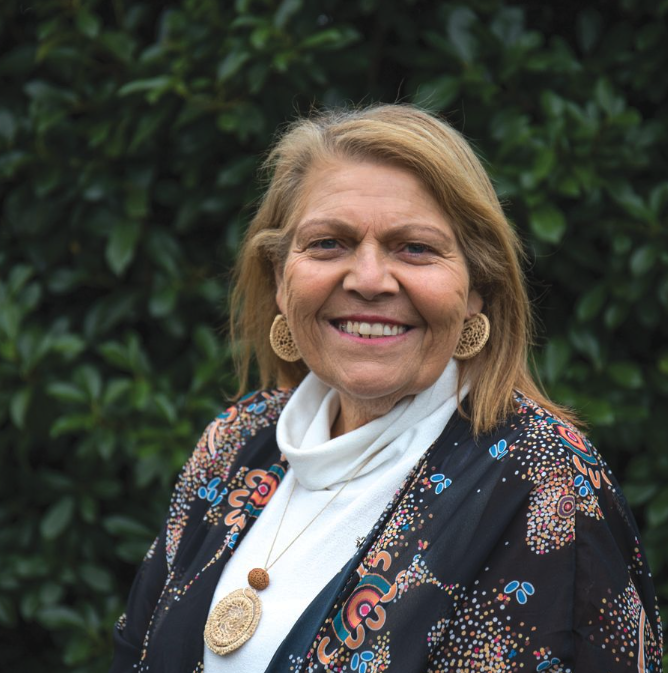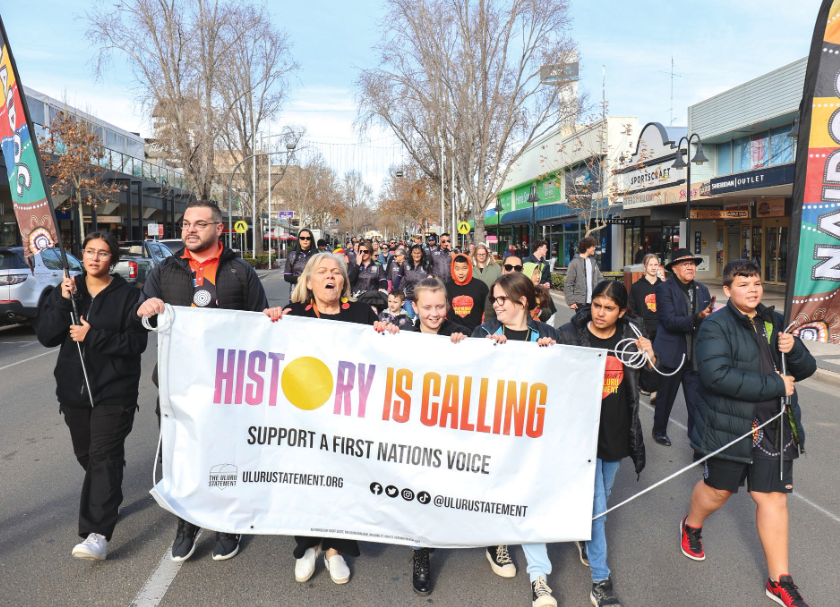
Aunty Mary Atkinson
The evening of 14 October was a gut-wrenching one for many Aboriginal and Torres Strait Islander people. While polling suggested a majority of Australian voters were unlikely to support the referendum for a Voice to Parliament, few pundits predicted such an overwhelming defeat. Aunty Mary Atkinson, a Wiradjuri elder, was crushed. She tells of her sadness, and her hopes.
“It really did devastate me,” said Aunty Mary, education advocate and cultural practitioner, who campaigned for the ‘yes’ vote. She needed that first week of silence after the referendum to just breathe and listen. It was a time for First Nations people to take care of each other, said Aunty Mary, who is a founding member the IEU’s Aboriginal and Torres Strait Islander Advisory Committee.
The outcome left Aunty Mary questioning her purpose. She spends much of her time working to develop cultural awareness in schools as the Aboriginal Community Liaison Coordinator for the Catholic Education Diocese of Wagga Wagga.
Over 70 per cent of people in the Riverina region voted ‘no’. When she heard the result, Aunty Mary began to doubt herself. She couldn’t help but wonder if she was doing the right thing. Was she talking to people who wanted to listen? Aunty Mary wasn’t sure anymore.
The educator went to a local school to run a professional development program and shared what she was feeling. She told attendees that her heart was heavy. They gave Aunty Mary a big hug, she recalls, and told her: “We are with you.” It made her feel a little lighter.
Mourning what could have been
The referendum has been a lot for the Elder to process. First Nations communities, she said, are tired of feeling they need to “keep going, keep going, keep going. How many times can you be knocked down?”
As a grandmother to 14 and a great-grandmother to two, Aunty Mary worries what the world will be like for the generations after her. She has seen her grandparents, her parents, herself, and now her children waging the same battles. “I don’t want that for my grandchildren,” she said. “I was hoping we’d be able to find a way forward.”
First Nations communities are in dire straits, she said. Aunty Mary points to the staggeringly high incarceration rate of Indigenous people in Australia. According to the NSW Bureau of Crime Statistics and Research, Aboriginal people accounted for more than 30 per cent of people in custody in September 2023.
The Voice was an opportunity to enshrine representation in the constitution, something that “can’t be taken away with the stroke of a pen”. Aunty Mary has seen that happen too many times. A new government comes in, abolishes existing programs, and goes back to the drawing board.
Reflecting on the loss of the referendum, Aunty Mary understands you can’t get people to join you if they don’t feel comfortable doing so. But Aboriginal and Torres Strait Islander people “haven’t been comfortable for a very long time in this country”, she said.
As heartbreaking as the result was, heartbreak is nothing new to Indigenous people, she said. “With that trauma, we also have resilience,” she said. “We are resilient people.”
The path ahead
In the wake of the referendum, it’s difficult to know what the next steps are. No matter what, any efforts need to be led by First Nations people, Aunty Mary said. “As I always say, ‘nothing for us without us’.”
Much has been written about the viability of a treaty. “I don’t think we’ll ever see a treaty in my lifetime,” Aunty Mary said. She believes that if Australians weren’t ready for the Voice, they’re not ready for a treaty, at least not federally. Aunty Mary thinks treaties could be signed on a state-by-state basis, with Victoria taking the lead.
She sees truth-telling as the way forward. What’s needed now, she said, is “deep listening and the sharing of our stories”. The nation needs to have some tough conversations.
It’s important for non-Indigenous Australians to listen and understand what Indigenous people have experienced and continue to face. She mentions the education system as an example. Until 1972, Aboriginal students in NSW could still be turned away from school under the Exclusion on Demand policy, enabling white parents to request the removal of Aboriginal students from the school.
“It’s not about naming, blaming or shaming,” Aunty Mary said, “it’s just telling some truths about Australia’s Black history.”
The importance of education
It may be up to the next generation to lead the way. That’s why education is so important, Aunty Mary said. She believes Aboriginal Education Workers play a vital role in schools. “They’re the face and they’re the voice for community in much of our schools,” she said.
Aboriginal Education Workers can advise on what can be shared and what is private to First Nations people. They can also “help the teaching staff and schools to deliver the local content of our cultural ways in a culturally safe environment”, she said.
It’s a challenging time for Aboriginal and Torres Strait Islander people in our schools, said Aunty Mary. Allies can offer support and kindness. “Put the hand out, and say, ‘I’m here for if you want to talk or listen’ and wait until the people are ready.” Some people may not want to talk, she said, and that’s OK.




































































































































